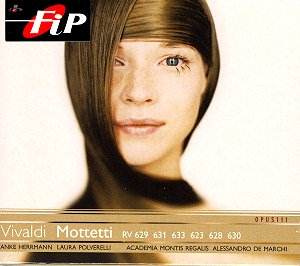When one looks into
somewhat older books on the life and
works of Antonio Vivaldi, there is little
chance that the vocal works are discussed.
And if they are discussed it is the
sacred works for soloists, chorus and
orchestra that get attention. The motets
are mostly completely ignored.
Twelve motets are extant,
two of which are incomplete. But there
is conclusive evidence that Vivaldi
composed a fairly large number of motets.
The genre of the motet was very popular
in those days and Vivaldi was not going
to be an exception. In the liner notes
Angelo Chiarle writes: "In eighteenth-century
Italy, a 'motet' was understood as meaning
a vocal work that was sacred but non-liturgical
in character, to a text in Latin verse.
Its place was in the moments of relative
silence during Mass (Offertory, Elevation
and Benediction) or Vespers (between
two psalms, given that the antiphons
were by that period rarely set to music)."
The practice of performing motets like
those of Vivaldi and his contemporaries
during Mass wasn't generally accepted:
the ecclesiastical authorities tried
to limit such performances. One of the
reasons was the character of the lyrics,
which according to the French author
Pierre-Jean Grosley (1764) were "a sorry
collection of rhymed Latin words, in
which barbarisms and solecisms are commoner
than good sense and reason."
In fact, motets were
first and foremost showpieces for singers,
often written for specific singers.
Many of Vivaldi's motets were written
for his pupil, later assistant Anna
Girò, who was a mezzo-soprano.
The structure is standardised:
every motet contains two arias, interspersed
by a recitative, and closes with an
'alleluia'. The scoring is solo voice
- either soprano or mezzo-soprano/contralto
- with strings and basso continuo.
Some of the motets
were written for the Ospedale della
Pietà in Venice, where Vivaldi
worked a large part of his life. But
others were written to be performed
in Rome, which Vivaldi visited in 1723
and 1724 and where he was in close contact
with Cardinal Ottoboni.
The present recording
is part of a Vivaldi Edition which aims
to record all extant compositions of
Antonio Vivaldi. A large part of the
job will be done by Italian soloists
and ensembles.
There is every reason
to be happy with the contribution of
the Academia Montis Regalis here. The
playing is very colourful and follows
the text of the motets very closely.
That makes it especially disappointing
that I can't recommend this recording
without reservation because of the inconsistent
performances of the singers.
Let me start with saying
that there are some excellent moments.
The last item on this disc, and one
of the most famous of all Vivaldi's
motets, 'Nulla in mundo pax sincera',
is sung very well by Anke Herrmann.
The contrasting character of the two
arias comes across convincingly, and
Ms Herrmann has no problems in this
technically demanding piece. She also
illustrates the singing of the nightingale
in the opening aria of 'Canta in prato'
very nicely.
Laura Polverelli does
quite well in 'Invicti, bellate', clearly
distinguishing between the two arias,
of which the first has a 'battaglia'
character, whereas the second is much
softer, being a prayer to Jesus that
the enemy - the night - may be beaten.
Unfortunately there
are also serious flaws in their singing.
The fact that I don't particularly like
their voices is a matter of taste. Their
extensive use of a rather wide vibrato
isn't: in the 18th century vibrato was
an ornament, not a way of singing, as
is the case here. A clear articulation
of the text isn't one of the strengths
of the singers anyway, and the extensive
use of vibrato doesn't make it any easier
to understand the lyrics.
Sometimes the voice
of Anke Herrmann does sound stressed
and uncomfortable, in particular in
the upper register, for example in the
opening aria of 'O qui caeli terraeque
serenitas'. The ornaments don't seem
to come very natural and the performance
lacks variety.
The two arias of 'Vestro
Principi divino' are characterised in
the booklet as "joyful and nimble",
but Laura Polverelli's interpretation
is rather dour and not joyful at all.
The dark colour of her voice doesn't
help in this respect.
These motets may be
vocal showpieces, but in my view the
abundance of ornamentation in the da
capo of the first aria of 'Longe mala,
umbrae terrores' seems somewhat over
the top. It doesn't enhance the expression,
but rather weakens it.
It is a shame that
the opportunity has been missed to deliver
a recording which does these motets
full justice.
Johan van Veen


